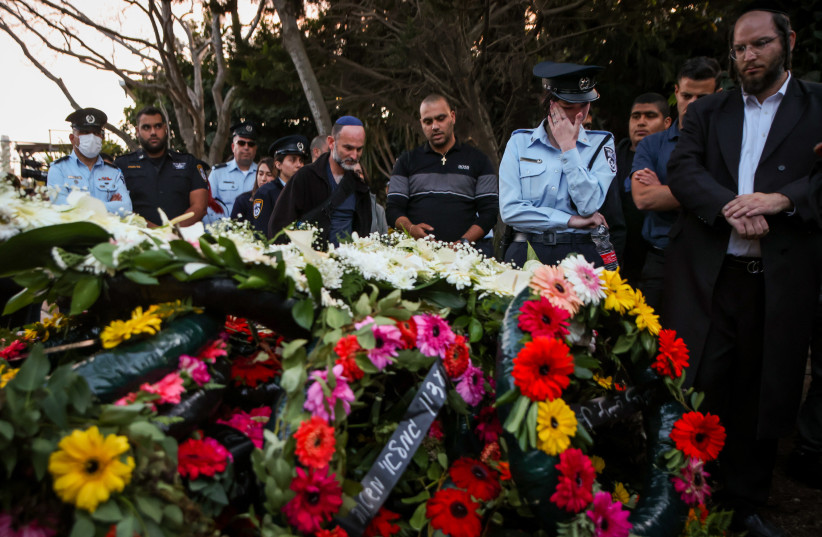The Talmud (Rosh Hashanah 10b) teaches that the month of Nisan is not only the time of year when our ancestors were redeemed from Egypt, but when we, too, will be redeemed. Yet this year, the feeling of miraculousness in the springtime air of Nisan has been tarnished by tragic acts of terrorism over the past few weeks. The violent murders of 11 innocent Israelis in such a short time don’t feel redemptive, and many are entering the month of Passover with anxiety and fear.
Yet even in the face of an escalation, it is crucial that we amplify the voices of those who are making every effort to build bridges and celebrate common purpose. This begins by calling attention to those non-Jews living in Israel who are committed to standing shoulder to shoulder with the Jewish people, regardless of their heritage.
Two of the recent victims, Yazan Falah and Amir Khoury, of blessed memory, were both uniformed Arab guardians of the State of Israel at the time of their deaths, the former a Druze and the latter a Christian. It was remarkable to see the estimated 200 Orthodox Jews who made their way from Bnei Brak, where Khoury was killed, to Nof Hagalil (Upper Nazareth) for his funeral service. Yaakov, a haredi (ultra-Orthodox) man who attended the funeral, told Channel 13, “He’s from another people, but we are brothers. He fought for us. We are obligated to come [to his funeral]. There is no other possibility.”
By the same token, I was extremely moved when I received a question from Rabbi Yoni Hollander, the principal of Ohr Torah Stone’s Derech Avot high school in Efrat. While on their annual trip in Galilee, the 10th-grade students insisted upon detouring from their trip in order to pay a condolence visit to the family of Yazan Falah. Was doing so permitted?
I responded in the affirmative and told him we are so blessed with students and faculty who wish to be involved in such a kiddush Hashem (sanctification of God’s name). What began as the idea of just a small delegation quickly grew into a shared desire among the entire grade, and with Hollander’s help, all 80 of them went to visit the family. The Falah family was extremely touched by the outpouring of love and spent time meeting with our students. “We all live in the same place, the same state,” Yazan’s uncle told the group, “and we have nowhere else to go. We have no other country and we are all destined for that same fate as partners in life.”

The students were similarly moved by the experience, feeling a deep sense of unity with those who were different from them in belief and practice.” In the words of one attending student, “for a few brief moments, we were able to be a part of one extended family.”
And we would be remiss if we did not allow ourselves to hear the voices of Muslim leaders who, social and political challenges notwithstanding, have insisted upon condemning the acts of terror and calling for solidarity, dialogue and non-violence. Rabbi Dr. Yakov Nagen, who oversees Ohr Torah Stone’s Blickle Institute for Interfaith Dialogue, shared with me many, many denunciations and condemnations of the recent attacks from Muslim leaders in Israel from a shared internal WhatsApp group.
“Friends, a somber night for all of us. Our hearts go out to the grieving families, whose loved ones were murdered in cold blood, and wishing a speedy recovery to the wounded. As religious leaders, we must call out these acts at every available opportunity.”
“Astounded by the tragedy in Hadera. Has no connection to the religion I learned from my parents and sheikhs, who taught me that Islam should be a source of peace in the world.”
“Murder by the hands of extremists only harms the possibility of a peaceful, shared life for all of us. We must keep fighting for peaceful coexistence.”
Hearing the sentiments of these religious leaders, finding and amplifying voices who desire partnership and solidarity, is an essential component of turning down the fire of rage and fear, transforming Nisan, once again, into the month of redemption.
As we make our way to Passover, let us remember this year the words of the Midrash Hagadol (Exodus 4:31), that the redemption from Egypt came bischar emunah, by the merit of the Jewish People’s faith. Even in the throes of servitude, the Jewish people maintained their capacity to envision a reality different from the one they saw before their eyes.
Tragedy and violence may be today’s headlines, but against all odds, we maintain our faith that they need not be tomorrow’s headlines, and we must work with all willing partners to make that possible.
We must work to usher in a time when, in the words of the prophet Isaiah (56:7), “my house will be a house of prayer for all nations.” Rather than be paralyzed by fear – even as we take steps to ensure our own safety and security – it is incumbent upon all of us to pursue the Torah’s vision of peace and solidarity.
The writer, a rabbi, is the president and rosh hayeshiva of Ohr Torah Stone, a Modern Orthodox network of 30 educational and social institutions and programs transforming Jewish life, learning and leadership worldwide.
